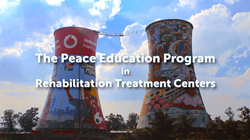[ad_1]

Orlando Towers’ Artwork: a symbol of rehabilitation in Soweto, South Africa
“I’ve had a lot of questions that I would love to learn, like know from life, and I couldn’t just ask anyone. So, when it was introduced to me, it was like a dream come true,” says Isla, Peace Education Program participant at Epilweni Rehabilitation Center.
LOS ANGELES (PRWEB)
July 11, 2023
From Substance Abuse to Self-Respect
For Isla, who is recovering from alcohol and drug abuse, the Peace Education Program offered by The Prem Rawat Foundation is, “Like a dream come true.”
Around the world in 54 different rehabilitation facilities, this powerful program is changing lives. Over 7,100 participants in these settings have experienced its effects.
Many of these individuals say the Peace Education Program enables them to discover their inner-strength, have self-respect, feel empathy and accept responsibility. They learn to see themselves and life in a whole new light.
Amazed by the change in himself, Benin, a participant in the Peace Education Program at the TAG Center in Johannesburg, South Africa, felt moved to help facilitate the program for others. Mental Health professionals agree that the success of any rehabilitation is based on the results. That this program is changing lives and also inspiring a passion to help others do the same, are surely heart-warming results.
Program participants from Zonderwater, a mammoth, maximum security prison in South Africa may not realize it, but their remarkable experiences are inspiring others too. Dezrita, a client of the TAG Rehabilitation Center beams as he identifies the “Zonderwater” video in the program as especially relatable and impactful. In the video, both participants and facilitators share their powerful experiences with the program.
“This programme has enlightened and empowered a lot of offenders to have peace within them and it also taught them to forgive other people. Some of them before the inception of the programme were always having conflict and anger within. After they attended the programme, they started to have peace,” says Head of Zonderwater Correctional Facility, Tivane Makasain, in an official letter to The Prem Rawat Foundation
One important part of this successful workshop series that is helping people rehabilitate from substance and alcohol use disorder is the integration of the self-reflection component. This enables change to come from within and helps those who are shy, cynical or guarded to be self-guided towards seeing themselves in a whole new light.
“I’ve had a lot of questions that I would love to learn, like know from life, and I couldn’t just ask anyone. So, when it was introduced to me, it was like a dream come true,” says Isla, Peace Education Program participant at Epilweni Rehabilitation Center in Johannesburg.
“To see a shift in a young person’s mind, from them not knowing who they are and to them finally discovering themselves and their innate tools, and being able to face and look at life in a different light has been one of the greatest things about facilitating,” says Tumi Mahasha, facilitator, TAG and Epilweni Rehabilitation Centers.
As more clients and facilitators around the world experience success incorporating this program into alcohol and drug treatment efforts, they reach out to others to bring hope and change.
In Pennsylvania, U.S., the James A. Casey House, like many substance and drug abuse treatment centers, uses methodology based on the TAP 19 manual developed by the Substance Abuse and Mental Health Services Administration.
However, James Casey, director of the treatment center emphasizes the success of the Peace Education Program as a complementary resource and explains that its effectiveness is spreading. “Those from the local A.A. and N.A. are now coming to us because they’ve heard so many amazing reports about the program,” says Casey.
Moreover, Casey says that his team is blown away year after year by the effects of the program.
“It is the most significant tool that we have to give people who’ve lost their hope. I’m watching it and seeing it every day… We are seeing a success rate of well above 60% — and that’s incredible, says Casey.
While the U.S. has one of the highest incarceration rates on the planet, the world-wide crisis of drug and substance abuse is a universal, human problem. The Peace Education Program’s success is in addressing the human being, rather than just “the addict.”
The Peace Education Program is an innovative series of video-based workshops that help people discover their own inner strength and personal peace. With over 325,000 participants and counting, The Prem Rawat Foundation provides access to the course materials to organizations and volunteers free of charge. The Peace Education Program is readily available to diverse populations in more than 80 countries and in 40 languages.
Learn more about The Prem Rawat Foundation and the Peace Education Program here.
Share article on social media or email:
[ad_2]

